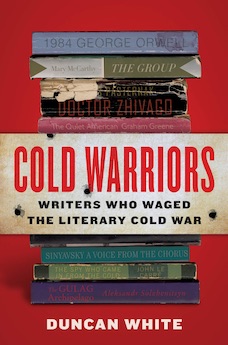By Benjamin Franklin Martin
In the quaint past of the early Cold War, when belief that literature could win hearts and minds was devoutly held, the CIA launched balloons to drop copies of George Orwell’s Animal Farm over Poland. Their choice was not haphazard: the appeal of satirizing Stalinism in the guise of a children’s book was obvious to all, and Communist agents in the United Kingdom had sought to prevent its publication. Equally important, the CIA realized that denunciation of the Soviet Union from the left was more credible than from the right, and Orwell had stridently written in 1946 that he was “against totalitarianism and for democratic socialism.”
More common than balloons was the CIA’s clandestine funding of organizations, like the Congress for Cultural Freedom, and publications, like Encounter, where left-leaning intellectuals, like Stephen Spender, or former Communists, like Arthur Koestler, could mount their attacks against repression behind the Iron Curtain while not always realizing who was paying the bill for their views. Here was the American response to the Soviet Union’s “elaborate and far-flung apparatus for exertion of its influence in other countries,” the warning famously given by George Kennan in his 1944 “Long Telegram” from the Moscow embassy.
Others needed no framework, their denunciations the sharper because the Soviet Union had betrayed their initial infatuation, like Mary McCarthy, who was sickened by the Purge Trials, the 1939 pact with Nazi Germany, and the assassination of Trotsky; like Graham Greene, who intuited the NKVD’s penetration of British intelligence; or like Orwell himself, who first experienced Stalin’s ruthlessness during the Spanish Civil War and while dying of tuberculosis wrote the quintessential analysis of such totalitarianism, Nineteen Eight-Four.
The Soviet Union lived down to everything they described: executing Isaac Bebel for his attack on Socialist Realism, humiliating and silencing Anna Akhmatova for her poems praising a Communism without Stalin, imprisoning Andrei Sinyavsky and Yulii Daniel for smuggling to the West their work critical of the Soviet Union, and compelling Boris Pasternak to refuse the 1958 Nobel Prize because his Doctor Zhivago questioned the very basis of the Russian Revolution. Yet the same left-leaners turned on the United States for the conduct of the Vietnam War—Greene’s The Quiet American and McCarthy’s visits to Hanoi and comparison of American body-count reports to Orwell’s “Newspeak”—and for endemic racism—Richard Wright adopting self-exile in Paris and writing Black Power about decolonization in Africa. The red-baiting of the late 1940s and early 1950s even vindicated unrepentant Communist Howard Fast’s Spartacus.
Duncan White tells all these stories and many more in Cold Warriors while arguing that literature was a potent weapon during the Cold War. Maybe so, but when the Soviet Union collapsed at the end of the 1980s, the cause was not the revelations of Aleksandr Solzhenitzyn’s Gulag Archipelago, proving that Communism had violated every human dignity, but instead the failure of the regime’s economy, symbolized by the Chernobyl disaster and by the far-too-late reforms of glasnost and perestroika undertaken by Mikhail Gorbachev. Likewise, the liberation of satellite states like Czechoslovakia was due not to sardonic plays like Václav Havel’s The Garden Party or to Havel’s inviting Mick Jagger, Paul Simon, and Frank Zappa to sing for freedom but to the inability of the Soviet Union to dominate eastern Europe any longer. Even so, the words and ideas of that literature remain inspiring.
Benjamin Franklin Martin (ΦΒΚ, Davidson College) is Price Professor of History Emeritus at Louisiana State University; his most recent book is Roger Martin du Gard and Maumort: The Nobel Laureate and His Unfinished Creation (2017).




